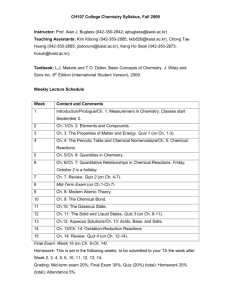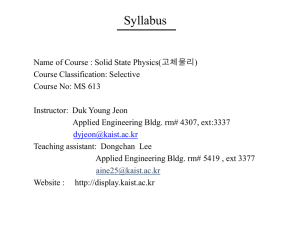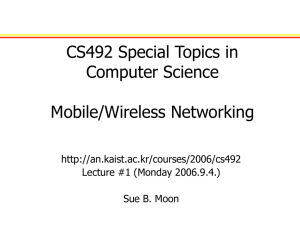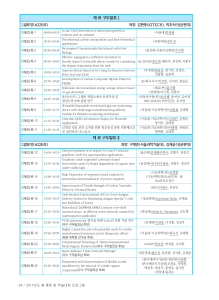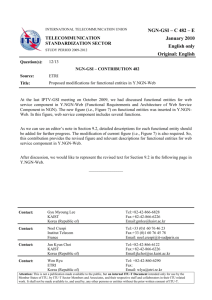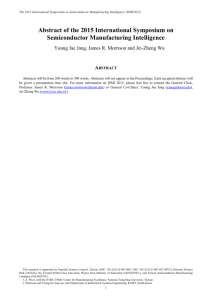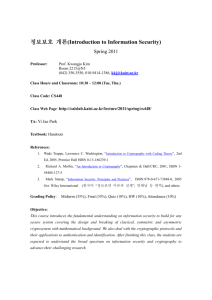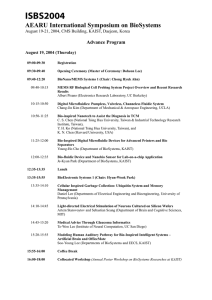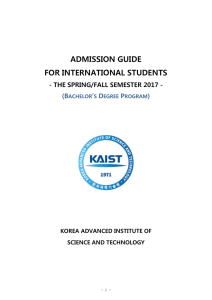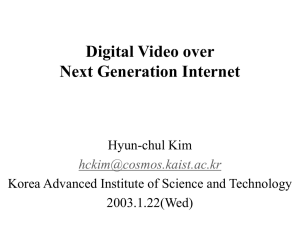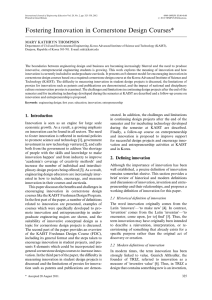Schedule, ME315, Sp.95
advertisement
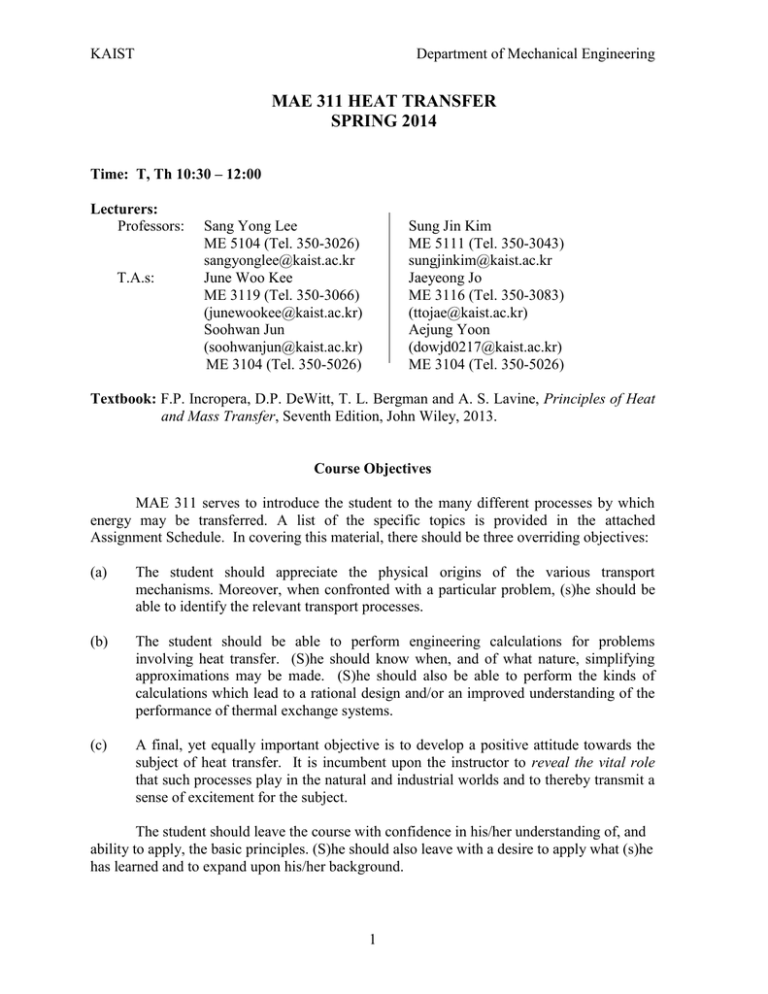
KAIST Department of Mechanical Engineering MAE 311 HEAT TRANSFER SPRING 2014 Time: T, Th 10:30 – 12:00 Lecturers: Professors: T.A.s: Sang Yong Lee ME 5104 (Tel. 350-3026) sangyonglee@kaist.ac.kr June Woo Kee ME 3119 (Tel. 350-3066) (junewookee@kaist.ac.kr) Soohwan Jun (soohwanjun@kaist.ac.kr) ME 3104 (Tel. 350-5026) Sung Jin Kim ME 5111 (Tel. 350-3043) sungjinkim@kaist.ac.kr Jaeyeong Jo ME 3116 (Tel. 350-3083) (ttojae@kaist.ac.kr) Aejung Yoon (dowjd0217@kaist.ac.kr) ME 3104 (Tel. 350-5026) Textbook: F.P. Incropera, D.P. DeWitt, T. L. Bergman and A. S. Lavine, Principles of Heat and Mass Transfer, Seventh Edition, John Wiley, 2013. Course Objectives MAE 311 serves to introduce the student to the many different processes by which energy may be transferred. A list of the specific topics is provided in the attached Assignment Schedule. In covering this material, there should be three overriding objectives: (a) The student should appreciate the physical origins of the various transport mechanisms. Moreover, when confronted with a particular problem, (s)he should be able to identify the relevant transport processes. (b) The student should be able to perform engineering calculations for problems involving heat transfer. (S)he should know when, and of what nature, simplifying approximations may be made. (S)he should also be able to perform the kinds of calculations which lead to a rational design and/or an improved understanding of the performance of thermal exchange systems. (c) A final, yet equally important objective is to develop a positive attitude towards the subject of heat transfer. It is incumbent upon the instructor to reveal the vital role that such processes play in the natural and industrial worlds and to thereby transmit a sense of excitement for the subject. The student should leave the course with confidence in his/her understanding of, and ability to apply, the basic principles. (S)he should also leave with a desire to apply what (s)he has learned and to expand upon his/her background. 1 KAIST Department of Mechanical Engineering COURSE POLICY - SPRING 2014 1. Prerequisites. MAE 311 must be preceded by MAE 221. If you do not meet this requirement, see your Lecturer immediately. 2. Assignments. You are expected to fulfill each assignment in the following manner: (a) The Lecturer will only highlight the materials corresponding to a particular period and work illustrative problems. You will do the reading corresponding to a particular period before the scheduled lecture for that period. (b) Since your Lecturer will constantly be referring to material in the text, you should bring the text to class. (c) Homework should be submitted at the beginning of the class on the designated due date. See page 4 for an example of homework solution format. You should follow this format in solving all your assigned homework problems. Homework problems submitted will be graded and returned to you at the end of the following lecture. All problem solutions will be posted on the webpage of MAE 311 immediately after they are due for your further study. 3. Quizzes. Class quizzes of duration of 10 minutes may be given periodically in the lecture, generally without prior announcement, in order to highlight key points and to promote individual participation in the lecture. Each of these may involve material from reading or homework assigned for the lecture or material developed during the lecture. These will be graded and returned to you in lecture. Remember to bring a calculator to each lecture. 4. Midterm Exam. The exam will be given on the scheduled dates and will cover all assigned material. No make-up exam will be given except in the event of excusable absences due to illness or serious emergency. The exam is of open-book nature. 5. Final Examination. A final examination, given at the end of the course, will cover all material assigned through the course. No make-up exam will be given except in the event of excusable absences due to illness or serious emergency. It is of open-book nature. 6. Attendance. Classroom attendance is expected except in cases of illness, emergencies, or other special circumstances. Your attendance will be checked at the beginning of the class. Two tardy counts will be considered as one absence. In case of an absence, a written or email notice should be submitted to the lecturer. You will be held responsible for any material which is discussed in lecture, whether treated in the text or not. There will be no opportunity for make-up of missed assignments in the daily work (homework and exercises) except in cases of long term illness or serious emergency. 2 KAIST Department of Mechanical Engineering 7. Participation. You are encouraged to ask questions during the lecture regarding aspects of reading, homework or lecture material that is unclear to you. In addition, you may be called upon to answer questions, to comment on problem solutions, and/or lead discussions related to the lecture material. Demonstrating reasonable participation will require daily preparation and staying current with the assignments. 8. Grades. The course grade will be based on homework, exercise, participation and exam results. The following list gives the weighting of the various items to be used in the determination of grades for the course: Homework Problems Class Quizzes, Attendance and Participation Mid-Term Test Final Examination Total 20% 10% 30% 40% _______ 100% NOTE: Every two missed lectures would result in lowering your grade by one level. Suppose your original grade is A+. If you missed two lectures, your final grade would be lowered to A0. If you missed four lectures, your final grade would be lowered to A-. 9. Unethical Conduct. Communication between students in solving the homework problems is encouraged. However, each student is expected to do his/her own work in satisfying the homework problem requirements, and failure to do so will result in a grade of zero for the assignment. Any student caught copying from a solution manual will have his/her grade reduced by a full letter grade for each separate incident. Any student detected of cheating on an examination will receive a failing grade in the course, and related documentation will be sent to the Dean of Students Office, recommending termination from the University for a period of no less than one year. 3 KAIST Department of Mechanical Engineering Work problems on engineering paper, one problem to a sheet HOME WORK SOLUTION EXAMPLE PAGE KNOWN: State concisely what is known about the problem. FIND: State concisely what must be found. SCHEMATIC: Draw a schematic of the physical system being considered. Label important variables. If application of the conservation laws is anticipated, represent the appropriate control volume or control surfaces by dashed lines. Be sure to identify processes associated with control volume/surfaces. PROPERTIES: List the solid and/or fluid thermophysical properties used in your solution. Identify the table from the Text and especially the temperature at which the property was selected. ASSUMPTIONS: It is important that you put all the assumptions in one place so that they can be reviewed. At the outset, some assumptions may be obvious, like “steady-state conditions,” etc. But as you begin to model more complicated systems, the assumptions are extremely important to the logic of your analysis. ANALYSIS: Provide in sentence format, comments that make clear the logic and organization of your analysis. Be sure to identify by numbers any figures or equations taken from the Text. 4
